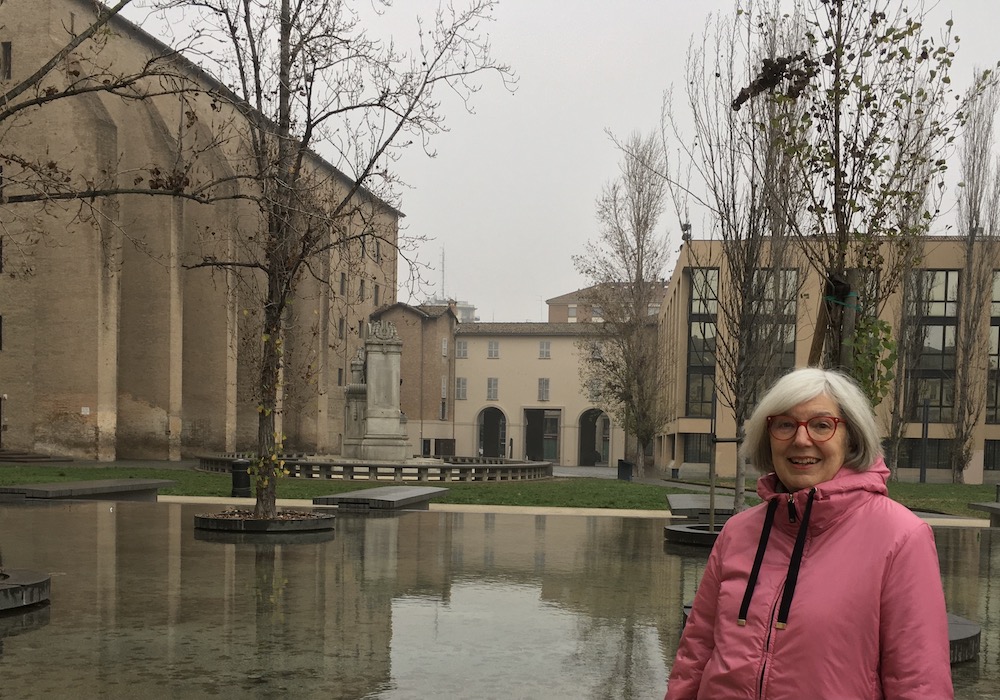If each city is like a game of chess, the day when I have learned the rules, I shall finally possess my empire, even if I shall never succeed in knowing all the cities it contains.
—Italo Calvino, Invisible Cities
Can you describe the mood of Florence as you feel/see it?
Quoting the Italian writer Tondelli, Florence has become the “Disneyland of the Renaissance.” It has been so for thirty years now. I remember a very different city back in the 1970s when I was growing up—today Florence belongs to the tourists and the shop-owners.
What is your most heartbreaking memory in this city?
I was born and raised here, and—besides the five years in the US—I spent all my life in this city. Therefore, I have a lot of memories. I remember, for example, the Saturday afternoons in wintertime I spent with my father in second-hand bookstores—now all gone, replaced by tacky souvenir shops.
What is the most extraordinary detail, one that goes unnoticed by most, of the city?
It’s hard to name just one . . . when you say Florence people think Michelangelo’s David and Botticelli’s Venus but there are several wonderful little churches and museums unknown to most visitors (and locals as well!).
What writer(s) from here should we read?
I would say Dante and Machiavelli to begin with! They had such a clear vision of human nature.
Is there a place here you return to often?
The Stibbert garden, a wonderful museum and park right outside the city center. I wrote some of my poems there and I try to visit it as often as possible. Stibbert, who lived at the end of the nineteenth century, was an obsessive collector and his house-museum is quite amazing.
Is there an iconic literary place we should know?
The center of Florence is scattered with Dante’s verses: the walls of medieval buildings become pages of the Divine Comedy!
Are there hidden cities within this city that have intrigued or seduced you?
The cemetery behind the church of San Miniato and the English cemetery where Elizabeth Barrett Browning lies in Piazzale Donatello. The first is very quiet, a perfect place to walk and think. The second is the nosiest cemetery ever, surrounded by avenues, but very charming nevertheless.
Where does passion live here?
A lot of people would say in the food but I believe that Florentines have a passionate relationship with their language. We really like to play with words!
What is the title of one of your poems about Florence and what inspired it exactly?
I have never written a poem about Florence. I have a lot of mixed feelings about my city and I never felt ready to write about it. But I had my students do it! Who knows about the future . . .
Inspired by Levi, “Outside Florence does an outside exist?”
I have a love/hate relationship with Florence. My city is my language, therefore my poetry, so there is no “outside” of it. But, sadly, Florence is frozen in time and you must leave it in order to grow up, because it’s outside where things keep happening, not here.
Elisa Biagini lives in Florence, Italy, after having taught and studied in the U.S. for several years. She has published six poetry collections—some bilingual, such as L’Ospite (Einaudi, 2004), Fiato. parole per musica (2006) and Nel Bosco (Einaudi, 2007). Her poems have been published in several Italian and American reviews and anthologies, and have been translated into English, German, Spanish, Portuguese, French, Croatian, Japanese, Slovak, Arabic, Serbian, Chinese, and Russian. She has translated several contemporary American poets for literary journals and anthologies namely Nuovi Poeti Americani (Einaudi, 2006). She teaches creative writing and art history in Italy and abroad. Apart from her work as a poet, Elisa has presented several installation projects in relevant art spaces and has collaborated with musicians, artists, and choreographers. (www.elisabiagini.it).
NH’s Discovery of the Month:
Complaining about tourists is a tradition in Florence. But it is difficult to stay away from this city of art. From the narrow streets to the Piazza della Signoria, the Via de' Tornabuoni, Ponte Vecchio, Palazzo Medici Riccardi, the Piazza Santo Spirito, Piazza Santa Croce, the Duomo, the Basilica di Santa Croce, the endless churches, Fiesole (a small hill town), the Arno River and across the river, to the less-known left bank—together they create a dreamland. One you are not certain you are seeing, it’s so astounding. And then you remember there is more. It is the city where Michelangelo, Galileo, and Ghiberti are buried, where Renaissance master Michelangelo Buonarroti, poet Dante Alighieri, author Niccolò Machiavelli, composer Gioacchino Rossini (Barber of Seville) are from.
Where museums and galleries are everywhere—Palazzo Strozzi, Uffizi Gallery, Palatine Gallery, Accademia Gallery, Bargello (a former prison), Museum of San Marco, For Gallery, Biagiotti Arte Contemporanea. And yes, bookstores still exist here too—Giorni–Libri Stampe Occasioni, Libreria Bruno Baccani, Libreria Martelli, La Feltrinelli International, and BM Bookshop. And the Mercato Centrale (marketplace) is a treasure.
Some Italian writers to read: Eugenio Montale, Eugenio De Signoribus, Edoardo Sanguineti, Rosita Copioli, Antonella Anedda, Franco Buffoni.
So many authors have written about this city. But it’s what Henry James said that stays with me – severe and majestic. Yes. And that eternal quality Florence possesses is especially alive in the light that envelops it.
Don't miss Elisa Biagini in the USA, reading from her new bilingual book, A Guest in the Woods
Oct 21 Queens College, NY, 530pm
Oct 22 Rutgers University, NJ, 530pm
Oct 24 University of Virginia, VA, 6pm
Oct 29 Fordham University, NY, 10am
Oct 31 State University of New York-Stony Brook, NY 4pm











